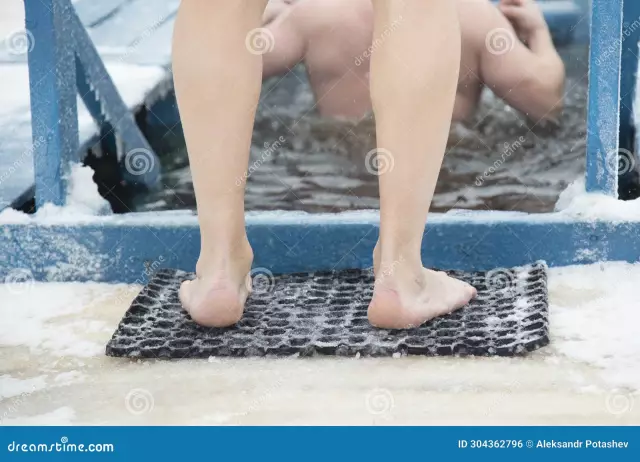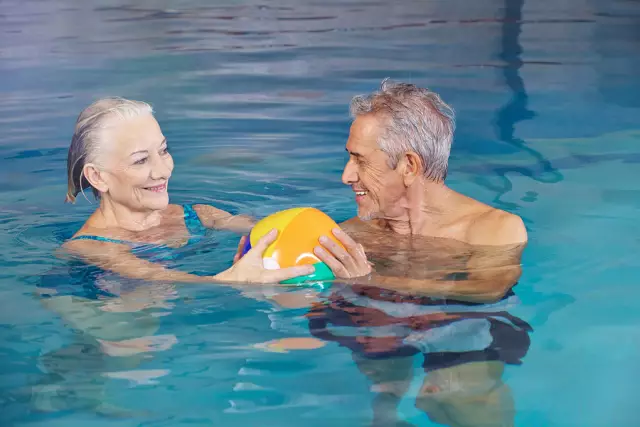- Author Rachel Wainwright wainwright@abchealthonline.com.
- Public 2023-12-15 07:39.
- Last modified 2025-11-02 20:14.
7 reasons to go swimming
A person's health status depends on many factors. One of our most important needs is constant (but not exhausting) physical activity. Experts often advise patients with various ailments to go in for swimming, which takes a leading place in the effectiveness of recovery, while having relatively few contraindications. Today we will talk about the main aspects of the therapeutic effects of swimming on the human body.
Complex training of all muscle groups
Pool exercises can successfully replace training on a wide variety of simulators. When a person swims, almost all muscle groups work for him, and each of them experiences an optimal load. Excessive strenuous exercise leads to excessive development of the muscles of the shoulder girdle, which is sometimes noticeable in professional swimmers, but for people who swim solely for therapeutic or recreational purposes, this is not relevant. On the contrary, regular visits to the pool, as a rule, ensure harmonious body shaping and, as a result, a beautiful figure.

Source: depositphotos.com
Prevention of diseases of the musculoskeletal system
When immersed in water, the human body becomes lighter. In this state, the work of muscles and ligaments is simplified, movements in the affected joints are less painful. When swimming, the load on the spine decreases, the small muscles of the back relax. As a result, a person can actively move even in the presence of severe diseases of the musculoskeletal system (herniated intervertebral discs, arthrosis, arthritis, osteochondrosis, etc.). For some patients, exercises in the pool are the only way to get the necessary motor loads. Swimming is also recommended for patients who are in the rehabilitation period after injuries, as well as for children and adolescents suffering from various forms of scoliosis.

Source: depositphotos.com
Gentle cardio load
Regular swimming lessons are indicated for patients with angina pectoris, arterial hypertension, atherosclerotic vascular changes and other pathologies of the cardiovascular system. A swimming person creates the correct load on the heart muscle - it is not for nothing that such training is recommended even for patients who have undergone heart surgery.
In addition, classes in the pool have a beneficial effect on the circulatory system as a whole: they strengthen and optimize blood flow, relax the walls of blood vessels. This, in particular, makes it possible to significantly improve the condition of people with varicose veins: they receive gentle loads without increasing the venous pressure in the lower extremities.

Source: depositphotos.com
Helpful Exercises for the Respiratory System
Swimming is vital for those suffering from pathologies of the respiratory system. It is a combination of soft massage with breathing exercises, which has a beneficial effect on patients with chronic bronchitis, bronchial asthma, etc. The lungs of a swimming person work with increased load, which enhances their ventilation and increases the working volume, as well as promotes the elimination of pathogens. The condition of the pectoral muscles also improves: they become more elastic and mobile.

Source: depositphotos.com
Body hardening
As with all water treatments, swimming is a great way of hardening. By regularly exposing the body to temperature changes, a person strengthens his immunity. It has been found that those who visit the pool are much less likely to contract seasonal infections.

Source: depositphotos.com
Fighting excess weight
Experts say that the fight against extra pounds solely with the help of diets is not very effective. For successful weight loss, one should not only limit oneself in food, but also provide the body with the ability to quickly expend the calories received. Fully aware of the importance of regular physical activity, many fat people, however, are not eager to go to gyms. Most often, the fact is that exercising on simulators necessary for real weight loss can be very tedious and (at least at the first stage) do not bring positive emotions to everyone.
Swimming, on the other hand, is extremely enjoyable. With a high expenditure of energy, it does not cause severe fatigue and does not lead to painful sensations in the strained muscles. Let's not forget that a person who is overweight, when playing sports, exposes his musculoskeletal system to traumatic overloads. But while swimming, the risk of damaging the joints or the spine is practically reduced to zero.

Source: depositphotos.com
Weakening the influence of stress
For a modern city dweller, a state of nervous and emotional overstrain is more the rule than the exception. Constant stress destroys the nervous system, undermines the immune system, and reduces the ability to work. Water treatments are a recognized remedy for this scourge.
Of course, you can relax after a busy day with a shower, but swimming in the pool has its own characteristics. Scientists have found that the movements of a swimming person themselves optimize the work of the nervous system: they balance the processes of inhibition and excitation in the nerve fibers. In practice, this means that swimming invigorates with fatigue, lethargy and drowsiness, and with increased excitability, it stabilizes and soothes. In addition, physical activity helps to improve sleep, enhances the production of endorphins and saturates brain cells with oxygen, which leads to an increase in mood.

Source: depositphotos.com
The complex of activities in the pool may include not only swimming, but also different types of sports health-improving exercises - hydroshaping, hydro-aerobics, etc. Usually, medical and health-improving trainings are carried out by experienced specialists who monitor the condition of patients and help them choose the optimal load. Despite this, a person suffering from chronic ailments should consult with a doctor before starting classes, since even such a useful activity as swimming has a number of limitations and contraindications.
YouTube video related to the article:

Maria Kulkes Medical journalist About the author
Education: First Moscow State Medical University named after I. M. Sechenov, specialty "General Medicine".
Found a mistake in the text? Select it and press Ctrl + Enter.






